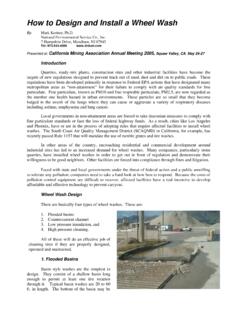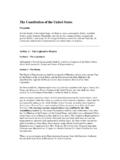Transcription of States. The New Hampshire Water Well …
1 1 The New Hampshire Water Well Association (NHWWA) is a non-profit organization that has been a principal custodian of New Hampshire s groundwater since 1967. The NHWWA is a member of the American Ground Water Trust ( ) the National Ground Water Association ( ) and the New England Water Well Association (NEWWA). The purpose of the NEWWA is to promote education in the industry; help each state organization promote rules and regulations in order to make state regulations more compatible, and to protect the environment of the New England States.
2 The New Hampshire Water Well Association s members consist of Water well drilling and pump contractors, Water conditioning professionals, geologists, hydrologists, engineers, state and local government employees and groundwater industry manufacturers and suppliers. Beyond maintaining high standards in the groundwater industry, the NHWWA is devoted to providing continuing education to its members and furnishing accurate information to the public regarding the quantity, quality, protection and availability of the state s groundwater resources.
3 The NHWWA works with government agencies, communities, landowners and industry to identify and solve problems associated with groundwater use. Click (HERE) for list of New Hampshire Water Well Association Members Information contained in this document is provided in good faith to inform the public about groundwater and Water wells. In all cases consumers are urged to contact local officials regarding permits and to refer to local codes, rules, regulations and laws for site selection, construction and operation of Water wells.
4 2 Purpose of the information What Is Ground Water ? The Hydrologic Cycle Potential Threats to Ground Water Ground Water Protection Consumer Guide How Do We Get Ground Water ? Drilling Well Development Yield Tests Low Yield Wells How Much Water Do You Need? Where Should the Well Be Located? Pump Selection Testing Water Quality for Health and Safety How Much Will a Well Cost? Do I Need a Contract? Professional Contractor Check List Your Water Well Record This consumer information has been prepared by the NHWWA to help people throughout New Hampshire make good economic and environmental decisions about Water wells.
5 Securing a safe Water supply for a home is an important responsibility for home owners. There are many Water supply specialists who provide Water supply products and services; this pamphlet will assist you to obtain the professional help that you need. Click (HERE) for list of NH WWA Contractor Members Ground Water is Water below the land surface that fills the spaces between grains of sediment and rocks, or fills cracks and fractures in the rock. Saturated zones in sediment such as sand and gravel, and in fractured rock formations, that receive, store and transmit Water to wells and springs are called aquifers.
6 Clean and plentiful groundwater is a vital resource for personal and economic health everywhere in the United States. Each day, over 150 million Americans get their drinking Water from ground Water . About 40 million are supplied from individual home wells. In New Hampshire 3 out of 5 people in the state are supplied from groundwater by Water utilities, small Water systems or private wells. Over 200,000 homes in the state have an on-site (private) well. 3 Water in aquifers comes from rain and melted snow that filters through the soil.
7 As the Water moves down, plants consume a portion, some is evaporated, and some is retained by the soil. The rest seeps downwards, usually very slowly, to add Water to the aquifer. This process is part of the hydrologic cycle. The amount and quality of ground Water varies from place to place in New Hampshire , because geology, climate and land use are different. The quality of Water from wells is influenced by natural factors, such as the type of rock, gravel, sand or soil where the groundwater moves or is stored.
8 Other factors such as pollution from poorly managed agriculture, urban runoff, inadequately maintained individual septic systems or community waste disposal sites can also have an impact. Public education about contamination, and community involvement in recognizing potential threats and protecting aquifers, can help ensure safe drinking Water throughout New Hampshire . Most well Water is good quality because of the filtering process in the soil and the long travel time underground between the Water occurring as rain or snowmelt and eventually reaching a well.
9 However, in addition to possible pollution from agriculture, industry and transportation, even contamination sources in our homes can pose threats Incorrect disposal of common household chemicals (polish, thinners, paints, etc.) excess use of lawn and garden chemicals, faulty or overloaded septic tanks, or an accidental spill during an automobile driveway oil change, can wreak havoc with drinking Water safety. The more informed that residents are, the better are the prospects for protecting New Hampshire s ground Water .
10 4 Some groundwater occurs at the surface as springs, but in most cases, a Water well is needed to reach the aquifer where ground Water is found. Today, most wells are made by drilling into the rock layers using drilling machines (rigs) to access Water deep beneath the surface. In most cases electric pumps are used to raise the Water to the surface. The creation of a Water well (a specially engineered hole in the ground) consists of several elements. After selecting the site to drill the well, (local codes and set-back requirements may limit choice), the process usually includes drilling, development, testing and equipment installation.




